gingerprince
|
| posted on 3/8/18 at 09:26 PM |

|
|
Structural Engineers
Hi
I'm in the process of buying a house (1991 build). Homebuyers survey has come back and pointed out quite a lot of cracks in the house and the
garage, and recommended that a structural engineer investigate further before exchanging contracts. As a consequence, my mortgage lender won't
lend until it's been given the all-clear by a structural engineer. This will obviously be a further cost, so I'm looking for opinions of
any here in the trade as to whether they're likely to be a cause for concern and whether to cut losses and run away now.
Basically there seem to be lots of stepped cracks in the mortar, albeit generally narrow, many of which have been re-mortared in years gone by. Some
seem to have re-opened. There is evidence of similar repairs on other houses in the area. The garage is worse with what appear to be potentially
more fundamental issues.
This picture shows a selection of repaired diagonals on the house: -
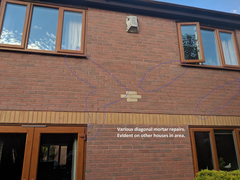 
Description
These ones that looks like they haven't been treated. They appear to be fairly fine: -
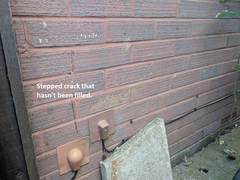 
Description
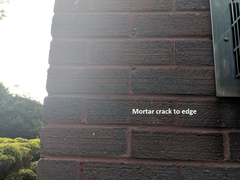 
Description
This is what looks to be a larger crack. Much wider than the above - what we don't know is what size all the repaired ones were: -
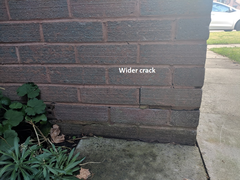 
Description
And an example of one that's been repaired and then re-opened: -
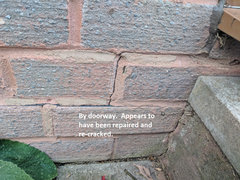 
Description
The garage appears to be worse. Here there is a horizontal crack all the way along the damp proof course line - wall being pushed outwards?: -
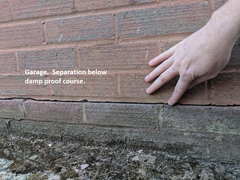 
Description
Inside the garage has had repairs and clearly recurred: -
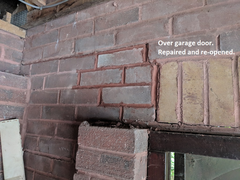 
Description
And another in the garage: -
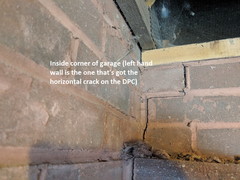 
Description
The floor is also cracked and crowned/uneven. Vendor used the word heave which shared the bejesus out of me - it's on a raft foundation I
believe.
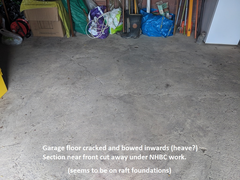 
Description
Finally, a couple of bits internally which probably aren't related but included for completeness: -
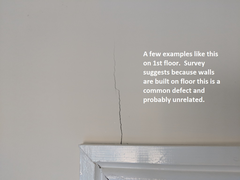 
Description
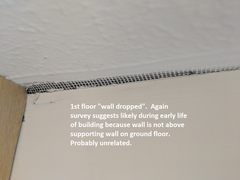 
Description
Here are these pictures and more in higher resolution: -
https://photos.app.goo.gl/nfuBzUpVxRZJRtL86
I'm concerned about the garage and I suspect that would be called out as an issue by an engineer. The house, cracks in the main seem pretty
fine, but the fact that there's lots of them, and they appear on other houses in the area has me worried, but it could just be that the
developer used sh1t mortar mix and it's temperature/expansion cracking? I can see a few outcomes: -
1) Run away now
2) Structural survey says "it's all fine, stop worrying".
3) Structural survey says "It may have stopped now, but we need to monitor it for a couple of years, causing insurance issues and hassle, and
potentially sell-on issues."
4) Structural survey says "It's f***ed, made!"
Would appreciate any views from those in the know before I feed back on my next steps.
Thanks
Simon
|
|
|
|
|
myke pocock
|
| posted on 3/8/18 at 09:47 PM |

|
|
House
If there are similar signs of failure on other houses in the area, presumably of the same or very similar design, then I would be questioning the
original structural design. My gut feeling is to walk away and look elsewhere for something that hasn't got issues.
|
|
|
theconrodkid
|
| posted on 3/8/18 at 09:54 PM |

|
|
can you check for previous insurance claims for subsidence, any mines nearbye ?, personally i would walk away
who cares who wins
pass the pork pies
|
|
|
perksy
|
| posted on 3/8/18 at 10:49 PM |

|
|
Walk away, There will always be another...
|
|
|
craig1410
|
| posted on 3/8/18 at 11:34 PM |

|
|
I'm an engineer but not a structural engineer but I have to say, those defects would bother me quite a bit as it clearly (in my opinion) shows
that the foundations of the house are not stable. Settlement is one thing but this is something else.
It's possible that the foundations are now stable and won't move farther but you'd need to be very sure about that and that will
cost quite a bit of money to ascertain.
As the last poster said, there will always be other houses so why take the chance on this one? If I was the seller of this property, I would have
commissioned a thorough structural survey to prove that it was safe. If they've not done that then why not?
|
|
|
Bluemoon
|
| posted on 4/8/18 at 07:04 AM |

|
|
Walk away. Next time you sell it will be a problem. Insurance companies are very risk adverse and you will need to declare it. We had similar issues
but on 1930s house but it is structurally sound, survey confirmed this but cracks still made getting insurance difficult.
[Edited on 4/8/18 by Bluemoon]
|
|
|
SteveWallace
|
| posted on 4/8/18 at 07:36 AM |

|
|
Be very careful with this. I have been dealing with a house (not mine) with very similar looking issues - to the extent that some of your photos
could have been the ones that I took.
To cut a very long story short, luckily the house still had an NHBC warranty and, after 14 years (yes, I do mean years) of discussion, argument and
remedial action, including two significant partial rebuilds we have finally reached a resolution. We had had three separate RICS qualified surveyors
stating that the net value of the house on the open market would be zero. This would remain the case for a good number of years even after repair due
to fears that the problems might return.
Over the course of the claim we have had borehole and trial pit surveys done and it has been inspected by a Fellow of the Institute of Structural
Engineers. No one could find a definitive answer or stop it moving.
On a slightly more positive note, its at its worst after a period of dry weather, so if your prospective purchase is the same then its maybe at its
worst at the moment.
Note that none of this means that yours is the same, but, a bit like trying to insure a pet with a known condition, even if you can get insurance they
will exclude the pre-existing structural problems.
"I know every nut and bolt and cog in that car, I built it myself" - The Prisoner, 1967
|
|
|
gingerprince
|
| posted on 4/8/18 at 10:46 AM |

|
|
Thanks all. Seems pretty unanimous, and I think underneath I knew that would be the case.
Had a quick google street map look around for a few more photos, and it definitely is evident on multiple properties, so seems I guess like poor
calculations for the support for the development? There's even one here that isn't filled and shows how the gaps are (it's been
filled since): -
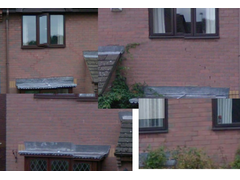 
Description
Area is former coal mining, but coal search revealed nothing under the immediate vicinity. They did call out nearby trees that would need to be kept
trim to prevent further underground drying.
I suspect it means we're going to have to find a rental somewhere fairly sharpish. We're advanced with the sale of ours, and really need
to be moved by September as junior starts new grammar school which is not really workable from where we live now.
Thanks.
|
|
|
mcerd1
|
| posted on 4/8/18 at 10:48 PM |

|
|
quote:
Originally posted by gingerprince
Area is former coal mining, but coal search revealed nothing under the immediate vicinity
coal mine abandonment maps don't often include the bits they weren't meant to mine but happened to be full of good coal 
(there are several streets where council houses used to be up here for exactly this reason)
-
|
|
|













